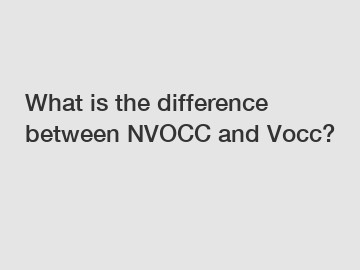What is the difference between NVOCC and Vocc?
What is the difference between NVOCC and VOCC?
In the shipping and logistics industry, the terms NVOCC (Non-Vessel Operating Common Carrier) and VOCC (Vessel Operating Common Carrier) are frequently used, often causing confusion among those who are not well-versed in the field. Both are crucial players in the transportation of goods across oceans, but they have distinct roles and responsibilities. Understanding the difference between NVOCC and VOCC is essential for businesses and individuals involved in international trade. In this article, we will delve into the disparities between the two and highlight their respective functions.
NVOCC (H2).

NVOCC, which stands for Non-Vessel Operating Common Carrier, is a transportation intermediary that arranges shipping services for cargo owners but does not own any ocean vessels. Acting as a consolidator, the NVOCC combines shipments from multiple customers into a single container to achieve economies of scale and negotiate better rates with shipping lines. They essentially function as freight forwarders, also handling administrative tasks such as documentation, customs clearance, and insurance.
NVOCC's have gained prominence due to their ability to provide flexible service options and competitive pricing. Their expertise lies in optimizing container space utilization, allowing businesses and individuals to ship smaller quantities of goods without having to hire an entire container. Moreover, NVOCCs often have established relationships with various carriers, giving them access to different shipping routes and reliable shipment schedules.
VOCC (H2).
VOCC, or Vessel Operating Common Carrier, is a shipping line that owns and operates its fleet of vessels. Unlike NVOCCs, VOCCs have a direct contractual agreement with cargo owners and are responsible for the entire transportation process, from loading at the origin port to unloading at the destination port. These carriers handle larger quantities of cargo and have the capacity to accommodate full-container-load (FCL) shipments.
VOCCs play a vital role in maintaining a regular and extensive network of shipping services worldwide. They own the vessels and maintain their schedules, ensuring that cargo is transported efficiently and reliably across different trade lanes. As such, VOCCs are subject to major investments in vessels, infrastructure, and advanced technologies to provide a seamless shipping experience.
Differentiation (H2).
The primary differentiating factor between NVOCCs and VOCCs lies in the ownership of vessels and the involvement in the complete shipping process. NVOCCs do not own vessels but collaborate with carriers to provide shipping services, while VOCCs own vessels and directly transport cargo. This distinction brings about various implications for customers and stakeholders.
Due to their ownership of vessels, VOCCs may have more control over factors such as pricing, availability, and reliability. Customers dealing with a VOCC have a direct contractual relationship, allowing for better transparency and accountability throughout the shipping process. On the other hand, NVOCCs offer flexibility by consolidating shipments, enabling smaller businesses and individuals to access global shipping services without having to commit to large volumes.
Conclusion (H2).
In conclusion, the difference between NVOCC and VOCC lies in their ownership and involvement in the shipping process. VOCCs are shipping lines that own vessels and handle the entire transportation, while NVOCCs act as intermediaries, arranging shipments through carriers without owning any vessels. NVOCCs provide flexibility and cost-saving options, while VOCCs ensure a direct contractual relationship and control over shipping services.
Understanding these distinctions is crucial for businesses and individuals navigating the complex world of international trade. Whether you require the comprehensive services of a VOCC or the streamlined options of an NVOCC, it is essential to partner with industry professionals who can guide you through the intricacies of global shipping.
If you have any further questions or require assistance in your shipping endeavors, please don't hesitate to contact us.
Are you interested in learning more about smart Parcel Logistics System, Transshipment Management Software design, logistics Sales and SLA Report? Contact us today to secure an expert consultation!

Comments